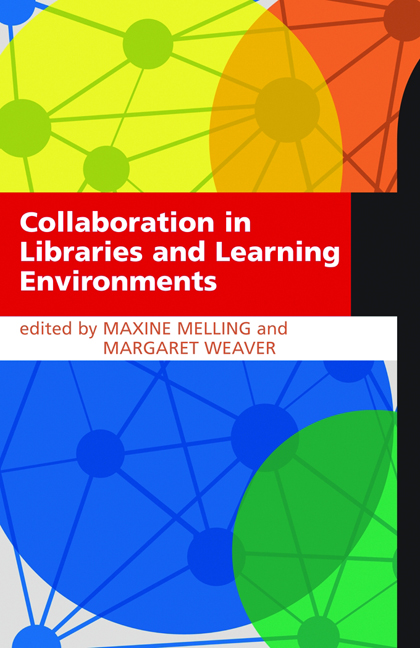Book contents
- Frontmatter
- Contents
- Contributors
- Introduction
- Abbreviations
- 1 The changing higher education context
- 2 Connecting with the student perspective
- 3 Working with professional associations
- 4 Culture, values and change: observations from three consortia in Canada
- 5 Managing complex change collaboratively
- 6 Leadership skills for collaboration: future needs and challenges
- 7 Knowing me … knowing you: the role of technology in enabling collaboration
- 8 Space: changing the boundaries
- 9 Collaborative service provision through super-convergence
- 10 Joint-use libraries and transformational change
- Index
2 - Connecting with the student perspective
Published online by Cambridge University Press: 08 June 2018
- Frontmatter
- Contents
- Contributors
- Introduction
- Abbreviations
- 1 The changing higher education context
- 2 Connecting with the student perspective
- 3 Working with professional associations
- 4 Culture, values and change: observations from three consortia in Canada
- 5 Managing complex change collaboratively
- 6 Leadership skills for collaboration: future needs and challenges
- 7 Knowing me … knowing you: the role of technology in enabling collaboration
- 8 Space: changing the boundaries
- 9 Collaborative service provision through super-convergence
- 10 Joint-use libraries and transformational change
- Index
Summary
Acknowledgements
The work of Kate Dickinson (Scarborough HR Co-ordinator) and Howard Foster (Scarborough Student Experience Manager) is acknowledged in contributing to the themes of this chapter.
Introduction
Motivated by student feedback, we realized that our model of service delivery on the Scarborough Campus of the University of Hull could be improved, particularly from a student interface perspective. The existing approach suited the university looking from its structures outwards rather than the students looking in. A review took place with a critical look at the support functions, team structures and interface points both within academic departments and professional service areas on campus. The aim was to make things work better from a student viewpoint. The review recommended a radical restructure of campus administration and support functions, development of a new highly streamlined approach to student interaction and a redesign of the spaces critical to this activity. It yielded a new library and reset it as the focal point of interaction with students at the heart of the campus. This chapter describes the fundamental shift in approach at Scarborough and reflects on the impact two years on from starting the change process.
One-stop shops, service convergence and libraries
Schultz and Szekeres (2008) highlight provision of service at the right point in the organization as one of the key challenges for universities. Many institutions have developed the concept of the ‘one-stop shop’ to consolidate aspects of on-campus service delivery at the interface level. This is widely acknowledged to be a good thing from a student support perspective, with positive implications for improved student access (Universities UK, 2002) as well as improved opportunities for student-centred business improvements (Soderstrom and Hedestig, 2008).
Some universities have developed an information commons as a means of helping students manage information or extended this further in the spirit of a learning commons to bridge the gap between academic and professional services via a range of functions to support learning (Schmidt and Kaufman, 2007). In many institutions the converged services agenda has focused around the library, and the term super-convergence has started to gain currency as a way of describing this change, to capture the direction of travel (Appleton, 2010; 2011; Weaver, 2010; Bulpitt, 2012). Super-convergence is defined as: ‘Bring[ing] together a range of support activities that are generally focussed on student support and are structurally converged in order to streamline provision’ (Heseltine et al., 2009).
- Type
- Chapter
- Information
- Collaboration in Libraries and Learning Environments , pp. 17 - 32Publisher: FacetPrint publication year: 2012

